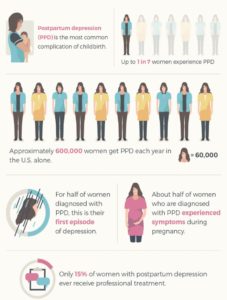Understanding and Responding to Moms with Postpartum Depression in our communities, in our families
May 3, 2019 • community
School of Public Health & Texas Center for Health Disparities Community Blog
Whether the first or third child, having a baby brings tremendous responsibility and readjustment in the daily routine. For many, the new life brings joy and happiness, but along with these celebrations, unexpected challenges may arise.
For the last 15 years, Dr. Amy Raines-Milenkov who has extensive research and community experience working with families in Tarrant County says, “pregnancy can be an exciting and busy time for a new mom to be. After the baby has arrived, however, many mothers find themselves isolated. The all-consuming care for the baby, physical and hormonal changes, sleepless days and nights and changes in relationships can leave mothers vulnerable to depression. Simple  acts of reaching out to new families with tangible support or creating opportunities for mothers and fathers can make the difference in a positive transition to parenthood.”1
acts of reaching out to new families with tangible support or creating opportunities for mothers and fathers can make the difference in a positive transition to parenthood.”1
How common is it? The Postpartum Roller Coaster
The most common misconception about postpartum depression is that it won’t happen to everyone. Did you know that almost 80% of new moms experience normal “baby blues” symptoms such as crying for no apparent reason, feeling angry or uneasy, and suffering from anxiety in the period after birth? However, these symptoms should taper off within two weeks post-delivery.2 If not, you could have Postpartum depression (PPD). PPD symptoms last longer and can be much more severe (See Figure 1).

In the United States, approximately 15% of women and 8% of men experience postpartum depression symptoms, though the numbers may be higher as people might feel embarrassed to talk about or know they have a problem, and may not have people around them to help.3 In fact, PPD is the most common complication of childbirth and for half of women diagnosed with PPD, it is their first time dealing with depression.4
Some people may feel like they are in a downward spiral and feel suffocated in this journey. Since people may not feel comfortable talking about it, only 15% women report receiving professional treatment for postpartum depression.4
Why is this important? Big! Not so blissful, changes
The postpartum period is a time of major changes for new parents. Even though you might have a completely healthy and happy baby in your lap, your mind is occupied elsewhere. New parents may not feel comfortable discussing their fears, failures, or challenges with friends, family or providers. Low levels of social support for the parents and their own struggles with stigma, fear, and guilt is found to be associated with increased risk of both depression and anxiety postpartum.5 Parents who are unable to find a balance between the physical demands of being a parent and fulfilling other tasks is one example. For single parent households, the challenge can be even more overwhelming. After delivery, the focus naturally shifts to the new member in the family and the parents can feel a burden to be well-rounded or model parents. For example, breastfeeding or following a routine to help parents and their child sleep can seem like tasks that are too hard. Simply put, parents do not think they have enough hours in the day to get everything done.
How can we help? Be Supportive
If you know of any new parents, sometimes giving them a word of encouragement and telling them they are doing a good job can go a long way. Some other ways to support new parents is to start by asking them what they need. This could be offering to help them prepare meals for the week, a grocery run to the supermarket, taking care of the child while the parent can get caught up on chores or sleep, going to follow up doctor’s appointment with the family, or buying them a gift card to their favorite restaurant or spa treatment. Many of these suggestions as well as others, can be found on a new App developed by Dr. Teresa Wagner under Amy Raines’ mentorship, What About Mom? The App also educates new moms about postpartum warning signs indicating they may have a medical emergency that requires emergent care.
Mom can click on the icons to explore symptoms she might be experiencing and her helpers can click on the icons to find tips for helping her whether around the house or handling her new role.
Even if she doesn’t tell you how she feels right away, she will likely appreciate the gesture. Health providers should screen all women during and following pregnancy with validated screening tools and be prepared to refer for appropriate treatment, whether that be medication therapy, counseling, or support groups.6 As a community, we should provide new parents resources including an open discussion/forum (with family, group of friends, or parent café’s) allowing them to share and acknowledge their emotions or seek help for severe depressive symptoms. With support and treatment, new parents can feel heard. If their emotions are validated, we will be able to see more people talking about their challenges and seeking the support they need.
References
- Raines-Milenkov, A. (2018, December). Email communication.
- Healthy Children. (2016, May). Depression during and after pregnancy: You are not alone. Retrieved from https://www.healthychildren.org/English/ages-stages/prenatal/delivery-beyond/Pages/Understanding-Motherhood-and-Mood-Baby-Blues-and-Beyond.aspx
- Postpartum Support International (n.d.). Pregnancy and Postpartum Mental Health Overview. Retrieved from http://www.postpartum.net/learn-more/pregnancy-postpartum-mental-health/
- Hetherington, E., McDonald, S., Williamson, J., Patten, S., & Tough, S. (2018, June). Social support and maternal mental health at 4 months and 1 year postpartum: analysis from the All Our Families cohort. Journal of Epidemiology and Community Health. 72: 933-939. Retrieved from https://jech.bmj.com/content/jech/72/10/933.full.pdf
- LARKR On Demand Mental Health Care. (2018, April). Things you might now know about Postpartum Depression [infographic]. Retrieved from https://larkr.com/things-might-not-know-postpartum-depression-infographic/
- The American College of Obstetrics and Gynecologists (ACOG). Depression and Postpartum Depression: Resource Overview. Retrieved from https://www.acog.org/Womens-Health/Depression-and-Postpartum-Depression?IsMobileSet=false
Research reported in this publication was supported by the National Institute On Minority Health And Health Disparities of the National Institutes of Health under Award Number U54MD006882. The content is solely the responsibility of the authors and does not necessarily represent the official views of the National Institutes of Health.



Social media